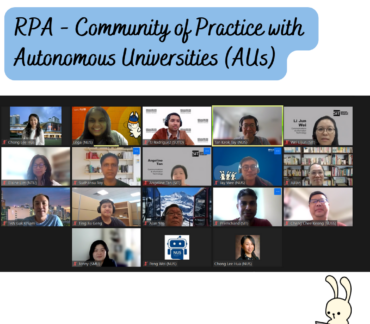We have observed a new wave of scam emails (known as Business Email Compromise or BEC) in NUS, some of which unfortunately involved individuals falling prey and leading to personal financial loss. Unlike phishing emails, these scams do not require you to click on any link or provide any credentials. Instead, they usually start with an innocuous message like “Are you available” and continue as a plea for help should one reply. Eventually, the scammer will attempt to convince and trick the victim into purchasing iTunes gift cards on their behalf. To add credibility, the emails are seemingly sent from someone of authority like the Head of Department using a spoofed email address.

High-Performance Computing (HPC) Community of Practice 2022!
For the first time ever, we had our High-Performance Computing (HPC) Community of Practice in person since its inception in 2020!
Serious vulnerability in Google Chrome browsers (November Update)
We have observed a new wave of scam emails (known as Business Email Compromise or BEC) in NUS, some of which unfortunately involved individuals falling prey and leading to personal financial loss. Unlike phishing emails, these scams do not require you to click on any link or provide any credentials. Instead, they usually start with an innocuous message like “Are you available” and continue as a plea for help should one reply. Eventually, the scammer will attempt to convince and trick the victim into purchasing iTunes gift cards on their behalf. To add credibility, the emails are seemingly sent from someone of authority like the Head of Department using a spoofed email address.
Do not click or respond to a phishing email with the subjects ‘NUS Help Desk’ or ‘Support Desk Team’
We have observed a new wave of scam emails (known as Business Email Compromise or BEC) in NUS, some of which unfortunately involved individuals falling prey and leading to personal financial loss. Unlike phishing emails, these scams do not require you to click on any link or provide any credentials. Instead, they usually start with an innocuous message like “Are you available” and continue as a plea for help should one reply. Eventually, the scammer will attempt to convince and trick the victim into purchasing iTunes gift cards on their behalf. To add credibility, the emails are seemingly sent from someone of authority like the Head of Department using a spoofed email address.

NUS IT Digital Enablement Team’s Sharing with AUs!
If you have not heard about it, Robotic process automation, or RPA in short, is a software technology that makes it easy to build, deploy, and manage software robots that emulate humans’ actions.
Serious WhatsApp vulnerability requiring an immediate update
We have observed a new wave of scam emails (known as Business Email Compromise or BEC) in NUS, some of which unfortunately involved individuals falling prey and leading to personal financial loss. Unlike phishing emails, these scams do not require you to click on any link or provide any credentials. Instead, they usually start with an innocuous message like “Are you available” and continue as a plea for help should one reply. Eventually, the scammer will attempt to convince and trick the victim into purchasing iTunes gift cards on their behalf. To add credibility, the emails are seemingly sent from someone of authority like the Head of Department using a spoofed email address.
NUS Anti-Phishing Disclaimer Page
We have observed a new wave of scam emails (known as Business Email Compromise or BEC) in NUS, some of which unfortunately involved individuals falling prey and leading to personal financial loss. Unlike phishing emails, these scams do not require you to click on any link or provide any credentials. Instead, they usually start with an innocuous message like “Are you available” and continue as a plea for help should one reply. Eventually, the scammer will attempt to convince and trick the victim into purchasing iTunes gift cards on their behalf. To add credibility, the emails are seemingly sent from someone of authority like the Head of Department using a spoofed email address.
Critical software vulnerabilities requiring updates on Apple devices (Sep 2022)
We have observed a new wave of scam emails (known as Business Email Compromise or BEC) in NUS, some of which unfortunately involved individuals falling prey and leading to personal financial loss. Unlike phishing emails, these scams do not require you to click on any link or provide any credentials. Instead, they usually start with an innocuous message like “Are you available” and continue as a plea for help should one reply. Eventually, the scammer will attempt to convince and trick the victim into purchasing iTunes gift cards on their behalf. To add credibility, the emails are seemingly sent from someone of authority like the Head of Department using a spoofed email address.
Serious vulnerability in Google Chrome and Microsoft Edge browsers
We have observed a new wave of scam emails (known as Business Email Compromise or BEC) in NUS, some of which unfortunately involved individuals falling prey and leading to personal financial loss. Unlike phishing emails, these scams do not require you to click on any link or provide any credentials. Instead, they usually start with an innocuous message like “Are you available” and continue as a plea for help should one reply. Eventually, the scammer will attempt to convince and trick the victim into purchasing iTunes gift cards on their behalf. To add credibility, the emails are seemingly sent from someone of authority like the Head of Department using a spoofed email address.
Critical software vulnerabilities requiring updates on Apple devices
We have observed a new wave of scam emails (known as Business Email Compromise or BEC) in NUS, some of which unfortunately involved individuals falling prey and leading to personal financial loss. Unlike phishing emails, these scams do not require you to click on any link or provide any credentials. Instead, they usually start with an innocuous message like “Are you available” and continue as a plea for help should one reply. Eventually, the scammer will attempt to convince and trick the victim into purchasing iTunes gift cards on their behalf. To add credibility, the emails are seemingly sent from someone of authority like the Head of Department using a spoofed email address.
